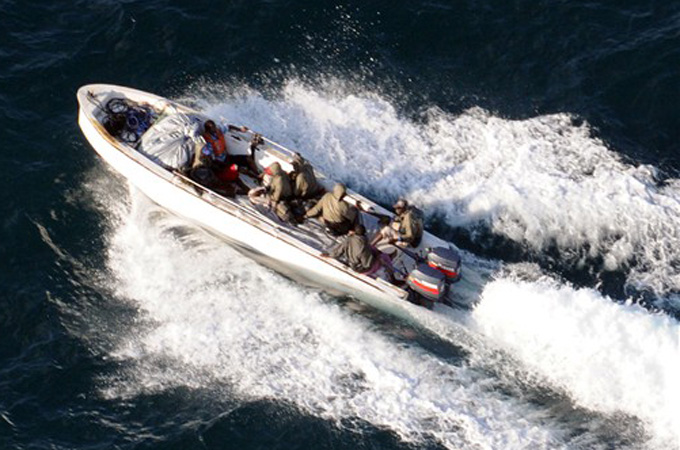Pirates face life sentence in US
Five Somali men face life in jail after being convicted over an attack on a navy ship off the Somali coast.

 |
| Somali pirates have broadened their attacks in recent months, targeting military, private and cargo ships [AFP] |
Five Somali men accused of attacking a US navy ship off Africa’s coast have been convicted on federal piracy charges, in what experts said was the first trial of its kind in more than a century.
The five men stood silently as the verdict was read on Monday in a US district court in Norfolk, Virginia. They face mandatory life terms at a sentencing hearing set for March 14.
Prosecutors argued during trial that the five had confessed to attacking the USS Nicholas on April 1 after mistaking it for a merchant ship.
The Nicholas, based in Norfolk, was part of an international flotilla fighting piracy in the seas off Somalia.
Defence lawyers had argued the men were innocent fishermen who had been abducted by pirates and forced to fire their weapons at the ship.
Confession
John S Davis, an assistant US attorney, had argued that three of the men were in a skiff that opened fire on the Nicholas with assault rifles, then fled when sailors returned fire with machine guns.
| In Depth | |||||||||||
|
Davis said all the men later confessed to the attack in remarks to an interpreter on board the ship. He said they expected to make anywhere from $10,000 to $40,000 from the ransom, a comparatively small sum.
Somali pirates recently received a record $9.5m for the release of a South Korean oil tanker and its crew. And as much as $1m was paid for the release of British couple Paul and Rachel Chandler.
Defence attorneys said it is not uncommon in virtually lawless Somalia for pirates to capture fishermen and essentially enslave them, forcing them to either do their bidding or be killed. They said that is what happened to their clients.
The attorneys argued that the men – Gabul Abdullah Ali, Abdi Wali Dire, Abdi Mohammed Gurewardher, Abdi Mohammed Umar and Mohammed Modin Hasan – had actually hoped to be rescued.
They also questioned the validity of the confessions obtained by the navy’s interpreter. The confessions were not videotaped.
Other countries, such as Germany, have recently held piracy trials, but legal and maritime scholars say one of the last in the US was in 1861 when 13 Southern privateers aboard the schooner Savannah were prosecuted in New York City.
The jury deadlocked and the men were later exchanged with the South.
